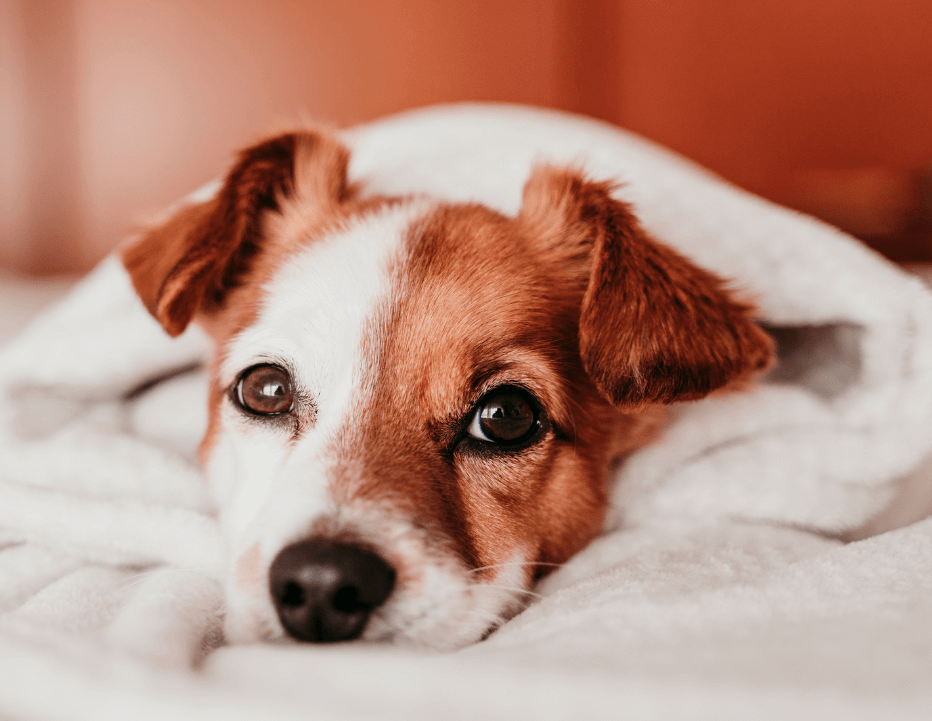Why Your Dog is Restless at Night

Unlike us, dogs get their sleep in blocks of time spread throughout a 24-hour period. Much of this sleep should occur concurrently with ours, and they will doze for the remainder of the night. Like us, sleep is vital for a dog’s brain development, memory retention and learning, their immunity and their mood. A restless dog at night may be at risk of not getting enough sleep, or they could be sleeping too much during the day leading to a more nocturnal existence. Either way, a restless nighttime pooch can interfere with the sleep needs of the entire household.
Causes of Sleeplessness at Night
According to veterinarian Dr. Sandra Mitchell, the average dog will sleep for 12 hours every day, varying with a dog’s breed, age, activity level and health. If in doubt, your veterinarian can advise you on how much sleep your dog needs. If your dog gets the bulk of his sleep during the day, then this will lead to an awake, alert and bored pooch at night.
Muscle pain, sensory changes, such as deafness or failing sight, and other medical conditions can all affect your dog’s sleep. Another common factor affecting their sleep at night is separation anxiety. Symptoms include pacing, crying when left alone, trembling and general loss of appetite and restlessness. Nighttime anxiety is common in older dogs, and tends to increase as they age.
Here we look at a few things you can try to naturally help minimise your dog’s restlessness at night.
Exercise
Consider whether your dog is getting enough exercise. Taking your dog for a walk and playing catch could help him get rid of any excess energy he may have, and result in a tired out pooch in need of extra sleep. Exercise is also just as good for dogs as it is for humans in the treatment of stress and anxiety. Exercise results in an increase of beneficial feel-good endorphins, as well as a means to work out any latent frustrations.
Food and Water
Hunger or thirst could be the reason your dog is restless. Take a look at his feeding schedule and check he is eating enough food for his size, breed, health and age. Monitoring dog food quality is as important as the size of their meals, making sure they don’t eat anything harmful that might leave them feeling sick or unhealthy. Watch for additional symptoms, such as weakness, vomiting, diarrhoea, loss of appetite or and signs of abdominal pain. Make sure your dog is given a bowl of fresh, clean water every day. About an hour before their bedtime, remove the water bowl to avoid nighttime stirring.
Toilet Before Bed
Is your dog waking you because they’re desperate for a wee? Remove water bowls an hour before bedtime and take your dog out to the toilet before bed each evening, just as we do.
Separation Anxiety
1. Distance training. Try letting your dog sleep in closer proximity to you, whether in your bedroom or just outside your door. The goal is to find a spot just close enough to you to alleviate their anxiety. Each night, gradually move their bed a little farther away until they are sleeping in the place you want them to.
2. Attention. Set aside at least 15 minutes each day solely for playing with him, in case the cause of their nighttime restlessness is to seek attention. If you ensure you give them enough of your time during the day, they may be more content to sleep at night.
3. Natural remedies. Chamomile is one of the safest herbs for dogs. Try pouring a quarter of a cup of chamomile tea over his last meal of the day to induce calm in preparation for a peaceful night. As with any herb, keep chamomile out of your dog’s reach.
Lavender oil works wonders for agitated dogs. Place one or two drops on their bed or blanket, taking care to not allow any ingestion.
White noise has been known to calm some dogs, whether it be ocean sounds or, as is the case for this writer, talkback radio. Experiment with a range of different sounds, you never know what might do the trick.
4. Dog bed. A feeling of safety may help anxious dogs. Calming dog beds have become increasingly accessible, so try to check the bed’s quality and online ratings before ordering. They work on the idea of creating a feeling of security via high, soft bed walls that hug your pup and hence aiding sleep. In this vein, compression garments have had varying results for anxious dogs, depending on whether it helps your dog to feel a squeeze around their body.
It’s hard work when your dog is restless at night. In your frustration, refrain from using negative reinforcement; they may not be able to help their behaviour. Give these tips a go, remembering that consistency is the key, and if nothing helps your dog, please take them to the vet. Their restless may be symptomatic of something more serious.
